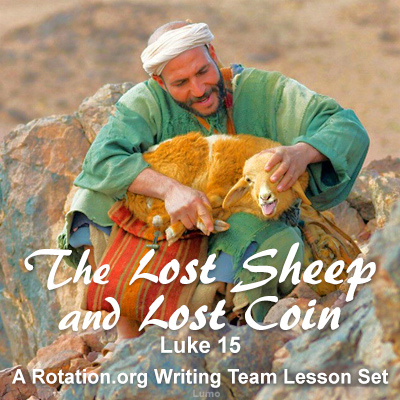The Rotation.org Writing Team's
Parable of the Lost Sheep
Parable of the Lost Coin
Bible Background
Scripture
Lost Sheep: Luke 15: 1-7
Astray Sheep: Matthew 18: 10-14
*Which version should you choose? Read on!
Lost Coin: Luke 15: 8-10
Key Verse: "Which one of you, having a hundred sheep and losing one of them, does not leave the ninety-nine in the wilderness and go after the one that is lost until he finds it? When he has found it, he lays it on his shoulders and rejoices." Luke 15:4-5 (NRSVue)
Lesson objectives for all the lessons in the set:
1. Students will be able to retell the basic story of the Parables of the Lost Sheep and Lost Coin to the best of their ability in their own words.
2. Students will learn that God's grace and love for them never gives up—that it is the will of God that every lost sheep and lost coin be found and reunited with God. (Matthew 18:14)
3. Students will understand what the terms "lost," "astray," and "found" mean in these parables with regard to their relationship with God and how they feel about themselves in the world, what things can make a person become lost or go astray, and what it means to be "found" by God.
4. Students will learn some compassionate and gracious strategies for helping others who may be “astray" or "lost" when it comes to believing in God, making good choices, going to church, and living a godly life.

Bible Background
Few Bible verses so vividly and succinctly put the "good" in the Gospel news like the Parables of the Lost Sheep and Lost Coin.
In the presence of "excluders" like the Pharisees and scribes, who didn't think Jesus should care about sinners, Jesus teaches them and us that God is for us and not against us, that he has come to seek and save, and not condemn or abandon.
These parables are a message of "radical" grace (free, unexpected, surprising, extreme, unconditional) that would eventually lead to Jesus' arrest and condemnation by the self-righteous religious establishment—and bring hope to the world. In contrast to so many other aloof and judgmental images of God, in these two tiny parables, Jesus teaches us that God doesn't give up on us, that God will find all those who are lost or gone astray and carry them home rejoicing.
 These parables are especially good news to the "little ones" (Matthew 18) who because of their family situation, relationships with others, personal struggles, and doubts can experience feelings of being abandoned, unworthy, unloved, or led in the wrong direction.
These parables are especially good news to the "little ones" (Matthew 18) who because of their family situation, relationships with others, personal struggles, and doubts can experience feelings of being abandoned, unworthy, unloved, or led in the wrong direction.
While these parables certainly speak to God's plan for salvation, they also remind us that each of us "counts" to God. God knows our hearts and troubles, our "lostness"—and promises to be with us, to put us on his shoulders and bring us home ~ always.
 By sharing the good news of these parables with our children, they will know that they are always unconditionally loved by God no matter who they are, what has happened to them, what they have done, or what they are going through.
By sharing the good news of these parables with our children, they will know that they are always unconditionally loved by God no matter who they are, what has happened to them, what they have done, or what they are going through.
 They will learn that they are special to God, that they count, they matter, and are never far from God's seeking presence even in the darkest moments.
They will learn that they are special to God, that they count, they matter, and are never far from God's seeking presence even in the darkest moments.
 They will begin to learn that, like God, we should reach out to others who feel lost or unloved and comfort them with grace and joy.
They will begin to learn that, like God, we should reach out to others who feel lost or unloved and comfort them with grace and joy.
The parables of the Lost Sheep and Coin are great news to everyone who has ever doubted, ever felt lost in the world, or strayed away from their faith, or ever been told they are "outside" of God's grace. These parables are a great hope to everyone who feels alone, unworthy, abandoned, or fears the fires of hell. God will not give up on you, says Jesus. God is looking for you. God has an eternity to find you, heal you, and restore you to himself. There's "nothing in all creation" that can separate us from the will of God. Nothing can stop the JOY God has planned.
The parables of the Lost Sheep and Coin are also a comforting word to everyone who has ever worried about a friend, family member, or student who has wandered away from God or his flock, or down a dark path. God the good shepherd and searching woman know where they are and will find them and restore them in God's own time. Says Jesus after telling the parable of the sheep in Matthew 18:14, "it is NOT the will of your Father in heaven that one of these little ones should be lost." God's will be done!
The parables of the Lost Sheep and Coin also remind us to REJOICE both in our being found and when God turns other people around. We are not to hold our past against ourselves, and not to hold other people's past mistakes against them. Apparently, the 99 need to be reminded of this because Luke uses the words "rejoice" and "joy" FIVE TIMES in our passage. And in Matthew 18's version of the parable, Jesus is instructing his disciples about welcoming others. Lost sheep not only need to be rescued and healed, they need people who will rejoice with them, not judge them.
 Three Surprising Things in These Parables
Three Surprising Things in These Parables
One of the wonderful things about reading and studying the Bible is discovering its surprises. And often as not, the surprises reveal the heart of the message.
SURPRISE #1: Matthew and Luke's versions of the Lost Sheep parable are significantly different
Our lesson plans use Luke's version with the kids, but let the teachers know there's another version of the parable in Matthew --nd they are not exactly the same parable!
A side-by-side comparison of Matthew and Luke's versions reveals significant and important differences in how Jesus' parable of the Lost Sheep was remembered and used to teach in the early church.
In Matthew 18, when Jesus tells the parable of the "astray" sheep, he is in the middle of addressing his disciples about how to treat fellow believers, especially the "little ones"—who aren't necessarily children, but are those who with "of little faith" or are new followers. Contrast that to Luke 15's version of the parable where Jesus is clearly addressing the Pharisees and scribes who were accusing him of spending time with outcasts and sinners.
Matthew uses the word "astray" to describe the sheep --a word which can be translated as "misled" or "distracted."
Luke uses the word "lost" to describe the sheep —which can be translated as those who are "outcast," or (spiritually) "perishing." "Lost" can also mean apart from God, lost their way, lost in sin, those without faith. ![]() See the word studies below for more about the differences between Matthew's "astray" and Luke's "lost" sheep!
See the word studies below for more about the differences between Matthew's "astray" and Luke's "lost" sheep!
For the purposes of teaching children, our lesson plans stick with Luke's version, but some lesson plans do explore what it means to be misled or wander away distracted from God.
SURPRISE #2: In the Parable of the Lost Coin, Jesus depicts God as a woman!
It's quite possible that you were NOT taught to think of the woman in Luke's Parable of the Lost Coin as anyone other than "just" a diligent woman. But Luke clearly places the parable of the Searching Woman right in-between two other parables where the searching figure is God—the Searching Shepherd and the Prodigal Son's Father. All three of these parables have God doing the searching—a shepherd, a woman, and a father, and all three find, celebrate, and invite others to celebrate with them.
(*This is not the first time God is described in the Bible as a woman or mother, and it's not the first time for Luke either. See Luke 13:34.)
Surprise #3 The coin in the parable of the Lost Coin isn't just any coin.
 Jesus' Jewish audience would have understood that the ten coins symbolically represented the Covenant—the "marriage" contract between God and his people. Indeed, many women in Jesus' day wore these coins as a sign of their marriage. To lose one of those coins would have represented a symbolic breaking of the Covenant—a contract Jesus came to "fulfill." In the time of Jesus and in later centuries and cultures, such coins were the symbol of a betrothal (marriage) between a couple and were worn by the woman as either part of her bridal veil or sewn into her clothing. (Over the centuries, the Covenant coins morphed into the tradition of engagement and wedding rings.)
Jesus' Jewish audience would have understood that the ten coins symbolically represented the Covenant—the "marriage" contract between God and his people. Indeed, many women in Jesus' day wore these coins as a sign of their marriage. To lose one of those coins would have represented a symbolic breaking of the Covenant—a contract Jesus came to "fulfill." In the time of Jesus and in later centuries and cultures, such coins were the symbol of a betrothal (marriage) between a couple and were worn by the woman as either part of her bridal veil or sewn into her clothing. (Over the centuries, the Covenant coins morphed into the tradition of engagement and wedding rings.)
God does not abandon some of his children just because he already has many. This is God's house. God's Covenant promise is made to each of us and is unbreakable.
A Closer Look at the Text
Matthew 18 and Luke's 15's retelling of the Parable of the Sheep share the following things in common with each other, and with the Parable of the Lost Coin in Luke 15:
- the 99, the 9 coins
- the 1 sheep, the 1 coin that is lost
- a searching shepherd or woman (i.e., God)
- rejoicing when the sheep or coin is found, and a call to others to rejoice
Other than those shared points, the details and vocabulary of Matthew and Luke's versions diverge in intriguing ways. Read on for some examples!
Matthew and Luke use similar but not exactly the same word to describe the sheep.
Matthew 18:12 uses the Greek word “planao” to describe the sheep that has separated from the flock. This isn't the common Greek word for "lost" at all. Rather, "planao" means "to be led astray," "to wander off," "to be deceived or misled." It suggests a follower who has been deceived and misled by the wrong message or wrong messenger. When you look at the entire 18th chapter of Matthew, the reason for describing the sheep as "astray" becomes clear. The entire chapter is devoted to how we should treat fellow believers, including the "little ones"—those of little or new faith, or who have fallen away or been misled. Granted, in English "astray" may also sound like someone who is "lost," but read on for more insight!
Luke 15 uses the more common Greek word for "lost" which is “apollymi.” This word doesn't just mean "lost" as in "I don't know where I am," instead, "apollymi" is also a Greek metaphor for "useless," to "perish," or "to be destroyed." It can describe people considered "outcast," "un-save-able," "trash," "unworthy," or "the condemned." It's a word that the Pharisees and scribes in Luke 15 (who are confronting Jesus) might have used to describe those who were unrighteous and "not worth saving"—the very people Jesus was accused of eating with. While it doesn't seem strange to us now, to many in Jesus' audiences, the idea that the Messiah had come to save the unworthy was news to them! Many had expected the Messiah to do just the opposite --to get rid of the unworthy, not save them.
How can the one short parable have two important variations in scripture? The differences we read between the Gospels may occasionally reflect the differences introduced by Jesus himself who, like all good teachers, undoubtedly reused and tailored his stories throughout his ministry for different needs and audiences. To the disciples he's tailored the parable of the sheep to the problem of falling away. To the religious authorities, he may have tailored his parable to talk about the lowly they were ignoring. Matthew's parable of the sheep may also reflect how the parable was remembered in the early church by those struggling to deal with believers who had little faith or who had backslid in their faith.
Isaiah 53's "Astray" Sheep
Jesus often quotes the prophet Isaiah, and undoubtedly drew his inspiration for the shepherd who intercedes for his lost sheep from Isaiah 53's song of the Suffering Servant:
"We all we like sheep have gone astray," and it is the Lord who “made intercession for the transgressors.” (Isaiah 53:6 and 12).
"Make intercession" in Hebrew literally means, "to meet, reach, or join." The Lord is the one who reaches the sheep. The Lord is the one who joins what has been separated. Intercession = salvation.
Like Matthew's sheep, Isaiah's sheep are also "astray" or "taw-aw" as Isaiah says in Hebrew. "Taw-aw" is often used in Hebrew to describe someone who is "wandering," "in error," "sinful," and even "staggering as if intoxicated."
Psalm 139: the parable from the sheep's point of view?
Likewise, Psalm 139 could easily have been on Jesus' mind when he taught these parables, only Psalm 139 describes the steadfastness of God from the sheep's point of view!
7 Where can I go from your spirit?
Or where can I flee from your presence?
8 If I ascend to heaven, you are there;
if I make my bed in Sheol, you are there.
9 If I take the wings of the morning
and settle at the farthest limits of the sea,
10 even there your hand shall lead me,
and your right hand shall hold me fast.
11 If I say, “Surely the darkness shall cover me,
and the light around me become night,”
12 even the darkness is not dark to you;
the night is as bright as the day,
for darkness is as light to you.
Whether we've gone astray on our own or been misled, or are just lost in our own sinful ways, through Matthew, Luke, Psalm 139, and Isaiah 53, Jesus reminds us that no sheep is ever too lost to be found.
The Woman and the Coin
 In Luke 15:8-10, a woman loses one of ten silver pieces (aka "drachma" in the Greek, i.e. "coins"), then lights a lamp and sweeps her floor to look for the lost coin. When she finds it, she calls her neighbors to rejoice with her.
In Luke 15:8-10, a woman loses one of ten silver pieces (aka "drachma" in the Greek, i.e. "coins"), then lights a lamp and sweeps her floor to look for the lost coin. When she finds it, she calls her neighbors to rejoice with her.
As mentioned, the first surprise is that the woman in the parable is a stand-in for God --just like the shepherd and father are stand-ins for God in Luke 15's other parables, But unlike the parable of the Lost Sheep where the sheep is at fault, in the parable of the Lost Coin it is the woman who loses the thing of great value. Does this mean God is a loser of coins? No. It simply means that not everything in a parable should be psycho-analyzed. Whereas the sheep got itself lost, Jesus doesn't say how the coin became lost, instead, Jesus focuses on what GOD does, and so should we.
The main point of both parables is that God searches diligently UNTIL what has been lost is found. And we are called to rejoice with God when it happens. (Some people, like the Pharisees, teach a stingy God who saves only the worthy. Jesus, on the other hand, teaches that God is a lavish sower of seeds, a relentless finder of the lost, and a joyful thrower of parties and banquets.)
GOD DOESN'T GIVE UP—no matter how many people he has saved from the wilderness or from the dirt, God searches for every last lost sheep and lost coin. Another way the Bible says this is when it calls God a "jealous" God -- which in the best sense of the word "jealous" means God will eventually find every last sheep and coin and bring them to himself. Why? Because God loves each soul, and each soul's salvation is the personal mission of God.
The Rejoicing!
One of the main themes Matthew and Luke's parables of the sheep and coin share in common is that of REJOICING. In fact, you might even call these "The Parables About Rejoicing" as much as "lost."
Luke's Jesus uses the word "rejoice" four times in a single verse! (Luke 15:4). Matthew only mentions rejoicing once in the parable but makes welcoming new believers and those with little faith a key point in the chapter. This suggests that to Jesus "rejoicing" was a very important part of the message he wanted to deliver to his disciples and detractors, and it was an important message within the early church.
The opposite of rejoicing in these stories might be "still holding a grudge," "still judging a person by their past and sins." And we know from experience that the church can sometimes feel like a place of judgment, not rejoicing; a place where "the regulars" are not welcoming to the newcomers and visitors. Sunday School classes are not immune to this. Teachers can sometimes send subtle signals about whom they "favor" and call upon. Kids can be very cliquey and "that's my seat" to others.
Rejoice = Welcome
Both Matthew and Luke use the Greek word chairo, "rejoice," to describe the shepherd's joy: "Chairo" is pronounced something like "high-roh" with a guttural "h" as in "Hhh-eye-row." "Chairo" means happy, cheerful, glad. It's a greeting that has come down to us as "Hail" and "Hi" in English but its biblical usage is one of joy and welcome and not mere politeness.
It's a common human response to look on new people as outsiders, or those who have "returned" as something lesser than those who "stayed," or the older as somehow better than the newer in faith. These parables remind us that we are all saved by the grace of God, and need to treat each other with the same love and respect that searched for us and laid us upon his shoulder.
The Repenting
Luke's versions of the parable of the sheep and coin each conclude with a line about "the sinner who repents." Some scholars consider the last sentences of Luke's two "lost" parables to be a later "explanatory" addition by a well-meaning early Church scribe. Matthew 18 doesn't mention a repenting sheep. None of the lessons in this set get into that idea either. Instead, with children we chose to focus on what the parables focus on --which is our amazing, relentless God --and the comfort and hope it fills us with.
Depending on your theological tradition, you may view the "repentance of sins" as either what a sheep must do in order to be carried home by the shepherd, OR what a sheep should do in response to being carried home and welcomed back into God's flock. In Reformed theology, repentance typically begins in a moment and continues through a lifetime. This is otherwise known as the doctrine of "justification" (I believe) and "sanctification" (help me lead a holy life).
"Repentance" literally means a change in direction, a turning back to God. But isn't it interesting that Jesus seems to be saying that it is God who changes direction! It is God who leaves the 99 and comes looking. It is God who gets down on his hands and knees to look for his coin in the dirt. It is God who rejoices, not the sheep! How fascinating.
What causes sheep to go astray? A coin to become lost?
That's a complicated question with as many answers as there are sheep! Each lesson in the Writing Team's lesson set addresses what "lost" can mean to children. Matthew and Luke's parables suggest a sheep can be led astray, pushed away, distracted, or simply think they are not worthy of being found. Jesus met many people who thought they were unworthy of God's grace, and each one he redeemed.
- Some people are easily led astray by others (including false teachers, tempters, well-meaning family members, and the wrong crowd).
- Some people go astray because they don't take the time to grow their faith, learn how to talk with and listen to God, know his word better, or seek the Spirit's help.
- Some sheep get lost in sin and can't break free of their habit, addiction, or its appeal.
- Some sheep think they are unworthy or unwelcome, that God can't forgive them, or maybe even God isn't really there.
- Many sheep slowly slip away from the flock because other things are more entertaining or easier. They don't take the time to worship or be with other growing Christians, or they let the actions of others push them away.
In the parable of the Lost Coin, the coin doesn't make itself lost or astray. Jesus simply says it becomes lost and focuses the rest of the parable's attention on what the woman does to find what is hers.
A Note about Sheep from a Shepherd
We are blessed to have an actual sheep rancher on the Writing Team for this lesson set! She reminded us that sheep aren't dumb, they just aren't good at protecting themselves. They are creatures of habit and prone to follow whichever sheep is leading, and thus need a good shepherd to guide and take care of them. Don't we all?
The truth is that every sheep strays and gets lost from time to time. What we need is hope and grace, and that's what Jesus preaches. We also need to find other sheep we can feel safe with and not feel judged or misled. That is the essence of what Matthew 18 is all about: caring for each other with grace and love.
Written for the Rotation.org Writing Team by Rev. Neil MacQueen (PCUSA)
Copyright Rotation.org Inc.
Shepherd and sheep background image courtesy of the Lumo Project.

 Welcome to the Rotation.org Writing Team's Parables of the Lost Sheep and Lost Coin lesson set! Seven wonderfully creative and diverse Sunday School lessons for two of the most important parables Jesus ever taught. The set includes a
Welcome to the Rotation.org Writing Team's Parables of the Lost Sheep and Lost Coin lesson set! Seven wonderfully creative and diverse Sunday School lessons for two of the most important parables Jesus ever taught. The set includes a 








